-
 Draper dumped out of Monte Carlo Masters by Davidovich Fokina
Draper dumped out of Monte Carlo Masters by Davidovich Fokina
-
Scheffler, McIlroy seek fast start as 89th Masters tees off

-
 EU halts counter-tariffs but no pause in US-China trade war
EU halts counter-tariffs but no pause in US-China trade war
-
Australian schoolboy Gout Gout runs sub-10 second 100m --- twice

-
 Scarlett Johansson to star at Cannes as festival unveils line-up
Scarlett Johansson to star at Cannes as festival unveils line-up
-
Stock markets soar as Trump delays painful tariffs

-
 Trump tariffs weigh on Germany as institutes cut forecasts
Trump tariffs weigh on Germany as institutes cut forecasts
-
US and Russia exchange prisoners

-
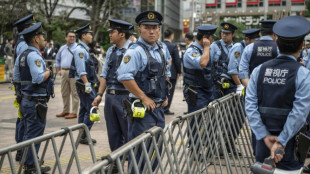 Japan top yakuza group promises 'no more trouble'
Japan top yakuza group promises 'no more trouble'
-
Champion Martin eyes Qatar return as 'bitter' Marc Marquez seeks redemption

-
 The US citizens still held in Russian prisons
The US citizens still held in Russian prisons
-
US-Russian ballet dancer Ksenia Karelina freed by Moscow: Rubio

-
 Not just penguins on Antarctic islands hit by Trump tariffs
Not just penguins on Antarctic islands hit by Trump tariffs
-
Canada PM says Trump's pause on tariffs a 'welcome reprieve'
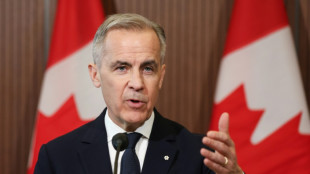
-
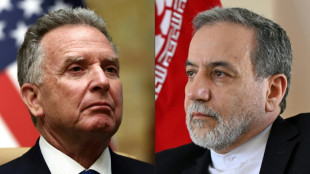 Witkoff and Araghchi: the men leading US-Iran nuclear talks
Witkoff and Araghchi: the men leading US-Iran nuclear talks
-
Stocks zoom higher as Trump delays painful tariffs

-
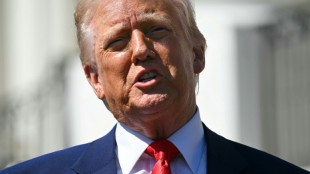 China urges US to meet 'halfway' as markets rocket on Trump tariff pause
China urges US to meet 'halfway' as markets rocket on Trump tariff pause
-
Vatican releases image of Charles, Camilla meeting pope
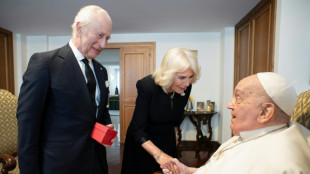
-
 Waratahs' McKellar rules out becoming next Wallabies coach
Waratahs' McKellar rules out becoming next Wallabies coach
-
Taiwan's TSMC says first quarter revenue up 42 percent

-
 Rybakina leads Kazakhstan to BJK Cup victory over Australia
Rybakina leads Kazakhstan to BJK Cup victory over Australia
-
Vietnam says it will start trade talks with United States

-
 Expo 2025 in Japan: five things to know
Expo 2025 in Japan: five things to know
-
Japan's World Expo touts unity, and algae, in turbulent times

-
 Trump's tariff pause gives market relief, but China trade war intensifies
Trump's tariff pause gives market relief, but China trade war intensifies
-
Papua New Guinea lifts ban on forest carbon credits
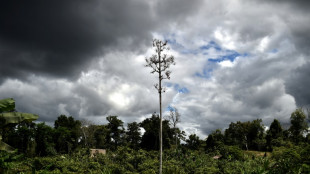
-
 AI surge to double data centre electricity demand by 2030: IEA
AI surge to double data centre electricity demand by 2030: IEA
-
Scheffler, McIlroy seek fast start in hunt for history at Masters

-
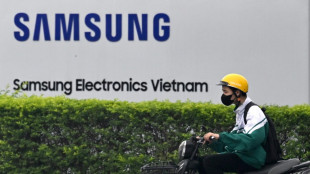 Samsung under pressure as US tariffs rattle South Korean economy
Samsung under pressure as US tariffs rattle South Korean economy
-
Munster wary of 'chaotic' Bordeaux-Begles in Champions Cup quarter-final

-
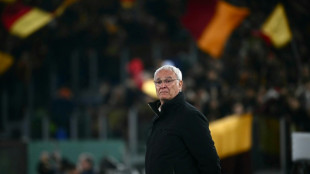 Ranieri eyeing Champions League for Roma before derby swansong
Ranieri eyeing Champions League for Roma before derby swansong
-
Verstappen out to silence McLaren in the battle of Bahrain

-
 Asian stocks crack higher as Trump delays painful tariffs
Asian stocks crack higher as Trump delays painful tariffs
-
Cannes to unveil film selection under pressure over industry abuse

-
 Messi scores twice in Miami's frantic comeback over LAFC
Messi scores twice in Miami's frantic comeback over LAFC
-
Swimmers get medal boost with new events added for 2028 Olympics
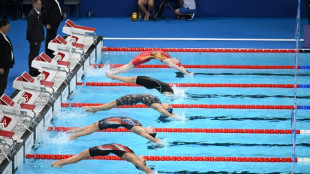
-
 Companies keen to start deep-sea mining off Norway
Companies keen to start deep-sea mining off Norway
-
US House votes to limit judges' injunction power
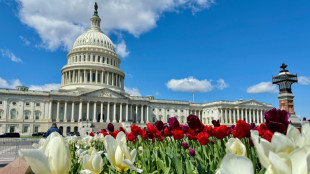
-
 Pilgrims in Italy flock to tomb of first millennial saint
Pilgrims in Italy flock to tomb of first millennial saint
-
China consumer prices slump for second straight month: data

-
 Tearful Doncic scores 45 on return to Dallas as Lakers clinch playoff spot
Tearful Doncic scores 45 on return to Dallas as Lakers clinch playoff spot
-
Hamas leadership operating behind veil of secrecy

-
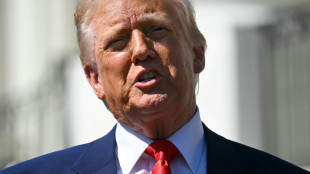 Trump stuns with tariff backtrack but hikes China rate to 125%
Trump stuns with tariff backtrack but hikes China rate to 125%
-
Messi scores twice in Miami's three goal comeback over LAFC

-
 Amazon satellite launch scrubbed due to weather
Amazon satellite launch scrubbed due to weather
-
Art of the deal? How Trump backed down on tariffs
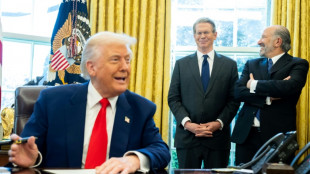
-
 Icotrokinra Results Show 75% of Adolescents with Plaque Psoriasis Achieved Completely Clear Skin and Demonstrate Favorable Safety Profile with a Once Daily Pill
Icotrokinra Results Show 75% of Adolescents with Plaque Psoriasis Achieved Completely Clear Skin and Demonstrate Favorable Safety Profile with a Once Daily Pill
-
Verde(R) Announces New Biobased, Biodegradable PolyEarthylene(R) Film Grades

-
 Berkeley SkyDeck Demo Day to Showcase Unprecedented Momentum in AI
Berkeley SkyDeck Demo Day to Showcase Unprecedented Momentum in AI
-
Classover to Hire 2,500 U.S. Teachers to Power Operations and Curate Proprietary AI Training Dataset

Ishiba's Plan to Change Power in Asia
Is Japan Preparing for War? Ishiba's Vision to Redefine Power in Asia
In a world where geopolitical tensions are intensifying, Japan finds itself at a crossroads. At the centre of this discussion is Shigeru Ishiba, a prominent Japanese politician and former defence minister, whose bold proposals to reshape Japan's security policies are sparking widespread debate. Is Japan merely safeguarding its sovereignty, or is it actively preparing for conflict?
A Paradigm Shift in Japanese Defence
Since the end of World War II, Japan has adhered strictly to its pacifist constitution, particularly Article 9, which renounces the use of war as a means of settling international disputes. However, as global power dynamics evolve and regional threats grow, Ishiba and other leaders argue that Japan must modernise its approach to defence.
Ishiba has proposed a significant expansion of Japan’s military capabilities, including increased defence spending, the development of advanced technologies such as missile defence systems, and a shift towards a proactive deterrence strategy. These measures, he asserts, are necessary to counter the rising influence of China and North Korea's nuclear threat.
The Strategic Context: Asia in Flux
Japan’s strategic positioning in Asia has long been a delicate balancing act. With China's growing assertiveness in the South China Sea, Taiwan Strait, and East China Sea, Ishiba’s call for a stronger Japanese military aims to counterbalance Beijing’s influence. North Korea’s missile tests and unpredictable behaviour further exacerbate the urgency for a robust Japanese defence policy.
Ishiba’s proposals align with the broader trend of Indo-Pacific nations strengthening security alliances, including Japan's growing collaboration with the United States, Australia, and India under the Quadrilateral Security Dialogue (Quad). These partnerships are seen as essential to maintaining regional stability and ensuring a free and open Indo-Pacific.
Domestic and International Reactions
Domestically, Ishiba’s vision has faced both support and opposition. Proponents argue that his policies are pragmatic and essential for Japan’s survival in an increasingly volatile region. Critics, however, worry that such moves could escalate tensions and provoke adversaries. The debate also revives questions about the reinterpretation of Japan’s pacifist constitution and its implications for national identity.
On the international stage, Ishiba’s stance has drawn mixed reactions. Allies like the United States welcome Japan’s increased commitment to regional security, while China and North Korea view these developments as provocative and destabilising.
Preparing for Conflict or Preserving Peace?
Ishiba has repeatedly emphasised that his aim is not to prepare for war but to prevent it. He argues that a strong deterrent capability is the best way to avoid conflict and maintain peace in the region. However, critics contend that expanding Japan's military footprint could trigger an arms race and inadvertently increase the likelihood of confrontation.
The Road Ahead
As Japan navigates these turbulent waters, Ishiba’s vision represents a pivotal moment in the country’s post-war history. Whether his proposals will redefine Japan’s role in Asia or exacerbate regional tensions remains to be seen. What is certain, however, is that Japan’s future decisions will have profound implications not only for its own security but for the broader balance of power in Asia.
As the world watches, the question remains: Is Japan preparing for war, or is it merely adapting to a new era of uncertainty? In answering this question, the nation must grapple with the delicate balance between safeguarding its future and upholding the ideals that have defined its modern identity.

Россия: Власть психует и чувствует неуверенность

Военный преступник России Путин не изменит судьбу человечества!

Россия: Военный преступник Владимир Путин на фронте войны

Russian Bastards murder defenceless children in Ukraine

Россия: Военные преступники Путин заберёт на войну всех

Тысячи погибших солдат российского террора опознаны! Свинья Пригожин теперь хочет мира?

Россия: Пропагандисты ликуют: отрезали голову!

Пригожин оправдывается | Лавров умоляет о везите в США

Россия: Здоровье Навального в опасности

Россия: Вагнеровцев не хотят хоронить!

Вам пришла повестка на Госуслугах. Что делать?



